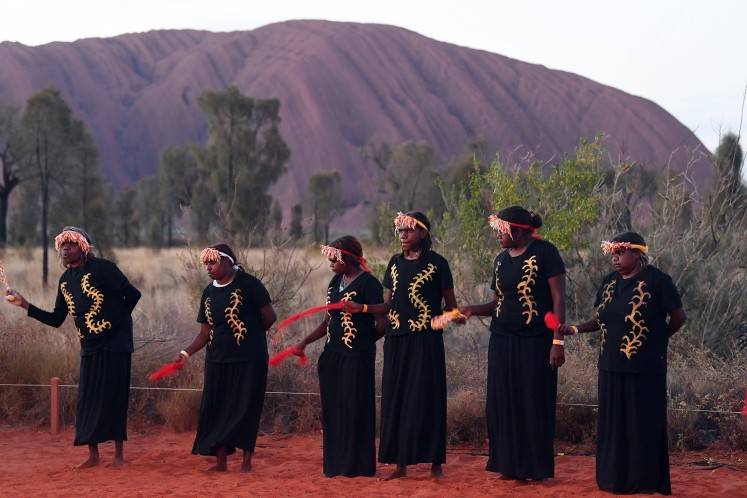Popular Reads
Top Results
Can't find what you're looking for?
View all search resultsPopular Reads
Top Results
Can't find what you're looking for?
View all search resultsCelebrations at Uluru after climbers permanently banned
Change text size
Gift Premium Articles
to Anyone
 Indigenous Anangu perform a traditional dance during a ceremony marking the permanent ban on climbing Uluru, also known as Ayers Rock, at Uluru-Kata Tjuta National Park in Australia's Northern Territory on October 27, 2019. Indigenous Australians performed songs and traditional dance as the sun set over Uluru on October 27, capping a weekend of celebrations to mark the historic ban on climbing the sacred site. (AFP/Saeed Khan)
Indigenous Anangu perform a traditional dance during a ceremony marking the permanent ban on climbing Uluru, also known as Ayers Rock, at Uluru-Kata Tjuta National Park in Australia's Northern Territory on October 27, 2019. Indigenous Australians performed songs and traditional dance as the sun set over Uluru on October 27, capping a weekend of celebrations to mark the historic ban on climbing the sacred site. (AFP/Saeed Khan)
I
ndigenous Australians performed songs and traditional dance as the sun set over Uluru on Sunday, capping a weekend of celebrations to mark the historic ban on climbing the sacred site.
The ceremony was held two days after a final surge of tourists who had flocked to central Australia scaled the giant red monolith before its closure to climbers.
A crowd gathered late Friday at the base of the site to watch rangers erect the "permanently closed" sign, in line with the long-held wishes of indigenous Australians.
"No more climbing today," shouted indigenous elder Nelly Patterson. "Close it," she yelled to a loud cheer from the crowd.
The ban, first announced in 2017, had long been sought by the traditional owners of the land, the Anangu, whose connection to the site dates back tens of thousands of years.
As well as respecting cultural practices, the ban is designed to protect the site from further environmental damage and ensure visitors' safety.
"We are all very happy, as traditional owners, that the climb is closed now, after a long fight from handback to today," Reggie Uluru told reporters through an interpreter on Saturday.
Previously known as Ayers Rock, the site was officially returned to the Anangu in 1985.
Read also: Tourists flock to Australia's Uluru for last ever climb
Signs at its base had implored visitors not to climb it, but they were regularly ignored by some, especially in recent months as thousands made last-minute ascents.
"I think it is important that mother nature has a bit of a break," the last climber at Uluru, James Martin, said.
"I would like to say to the Aboriginals that we are sorry and the world does indeed belong to every single person who was born on the planet," the Australian told reporters as he came off the rock at sunset on Friday.
Parks Australia added extra rangers on patrol over the weekend, with fines for those who attempt to summit the rock now reaching up to Aus$10,000 ($6,800).
"Although we expect our visitors to respect the law and the wishes of traditional owners when they visit, significant penalties can be issued," Parks Australia told national broadcaster ABC.
Work is expected to begin next week to remove a chain that was used by climbers to make the steep ascent.
Tourists are still being encouraged to visit the Uluru-Kata Tjuta National Park where they can view the monolith from its base, walk around its perimeter and learn about its indigenous heritage at the cultural center.






